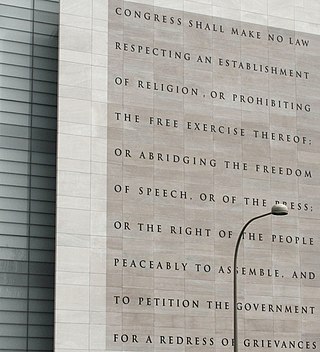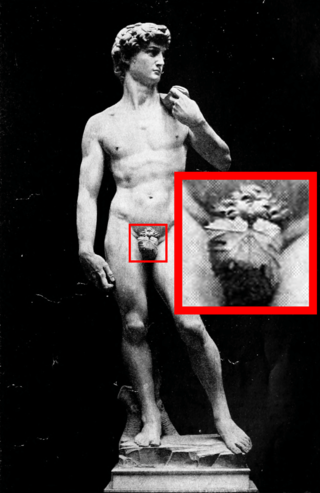Related Research Articles
Hate speech is a term with varied meaning and has no single, consistent definition. It is defined by the Cambridge Dictionary as "public speech that expresses hate or encourages violence towards a person or group based on something such as race, religion, sex, or sexual orientation". The Encyclopedia of the American Constitution states that hate speech is "usually thought to include communications of animosity or disparagement of an individual or a group on account of a group characteristic such as race, color, national origin, sex, disability, religion, or sexual orientation". There is no single definition of what constitutes "hate" or "disparagement". Legal definitions of hate speech vary from country to country.
The Communications Decency Act of 1996 (CDA) was the United States Congress's first notable attempt to regulate pornographic material on the Internet. In the 1997 landmark case Reno v. ACLU, the United States Supreme Court unanimously struck the act's anti-indecency provisions.
Hustler Magazine, Inc. v. Falwell, 485 U.S. 46 (1988), is a landmark decision by the Supreme Court of the United States in which the Court held that parodies of public figures, even those intending to cause emotional distress, are protected by the First and Fourteenth Amendments to the U.S. Constitution.
Certain subject-matter in Australia is subject to various forms of government censorship. These include matters of national security, judicial non-publication or suppression orders, defamation law, the federal Racial Discrimination Act 1975 (Cth), film and literature classification, and advertising restrictions.

In the United States, freedom of speech and expression is strongly protected from government restrictions by the First Amendment to the U.S. Constitution, many state constitutions, and state and federal laws. Freedom of speech, also called free speech, means the free and public expression of opinions without censorship, interference and restraint by the government The term "freedom of speech" embedded in the First Amendment encompasses the decision what to say as well as what not to say. The Supreme Court of the United States has recognized several categories of speech that are given lesser or no protection by the First Amendment and has recognized that governments may enact reasonable time, place, or manner restrictions on speech. The First Amendment's constitutional right of free speech, which is applicable to state and local governments under the incorporation doctrine, prevents only government restrictions on speech, not restrictions imposed by private individuals or businesses unless they are acting on behalf of the government. The right of free speech can, however, be lawfully restricted by time, place and manner in limited circumstances. Some laws may restrict the ability of private businesses and individuals from restricting the speech of others, such as employment laws that restrict employers' ability to prevent employees from disclosing their salary to coworkers or attempting to organize a labor union.
Prior restraint is censorship imposed, usually by a government or institution, on expression, that prohibits particular instances of expression. It is in contrast to censorship that establishes general subject matter restrictions and reviews a particular instance of expression only after the expression has taken place.
The term in loco parentis, Latin for "in the place of a parent", refers to the legal responsibility of a person or organization to take on some of the functions and responsibilities of a parent.

Hepting v. AT&T, 439 F.Supp.2d 974, was a class action lawsuit argued before the United States District Court for the Northern District of California, filed by Electronic Frontier Foundation (EFF) on behalf of customers of the telecommunications company AT&T. The plaintiffs alleged that AT&T permitted and assisted the National Security Agency (NSA) in unlawfully monitoring the personal communications of American citizens, including AT&T customers, whose communications were routed through AT&T's network.
In the United States, censorship involves the suppression of speech or public communication and raises issues of freedom of speech, which is protected by the First Amendment to the United States Constitution. Interpretation of this fundamental freedom has varied since its enshrinement. Traditionally, the First Amendment was regarded as applying only to the Federal government, leaving the states and local communities free to censor or not. As the applicability of states rights in lawmaking vis-a-vis citizens' national rights began to wane in the wake of the Civil War, censorship by any level of government eventually came under scrutiny, but not without resistance. For example, in recent decades, censorial restraints increased during the 1950s period of widespread anti-communist sentiment, as exemplified by the hearings of the House Committee on Un-American Activities. In Miller v. California (1973), the U.S. Supreme Court found that the First Amendment's freedom of speech does not apply to obscenity, which can, therefore, be censored. While certain forms of hate speech are legal so long as they do not turn to action or incite others to commit illegal acts, more severe forms have led to people or groups being denied marching permits or the Westboro Baptist Church being sued, although the initial adverse ruling against the latter was later overturned on appeal to the U.S. Supreme Court case Snyder v. Phelps.
Corporate censorship is censorship by corporations. It is when a spokesperson, employer, or business associate sanctions a speaker's speech by threat of monetary loss, employment loss, or loss of access to the marketplace. It is present in many different kinds of industries.
Internet censorship in the United States is the suppression of information published or viewed on the Internet in the United States. The First Amendment of the United States Constitution protects freedom of speech and expression against federal, state, and local government censorship.
The origins of the United States' defamation laws pre-date the American Revolution; one influential case in 1734 involved John Peter Zenger and established precedent that "The Truth" is an absolute defense against charges of libel. Though the First Amendment of the U.S. Constitution was designed to protect freedom of the press, for most of the history of the United States, the U.S. Supreme Court failed to use it to rule on libel cases. This left libel laws, based upon the traditional "Common Law" of defamation inherited from the English legal system, mixed across the states. The 1964 case New York Times Co. v. Sullivan, however, radically changed the nature of libel law in the United States by establishing that public officials could win a suit for libel only when they could prove the media outlet in question knew either that the information was wholly and patently false or that it was published "with reckless disregard of whether it was false or not". Later Supreme Court cases barred strict liability for libel and forbade libel claims for statements that are so ridiculous as to be obviously facetious. Recent cases have added precedent on defamation law and the Internet.

Censorship is the suppression of speech, public communication, or other information. This may be done on the basis that such material is considered objectionable, harmful, sensitive, or "inconvenient". Censorship can be conducted by governments, private institutions. When an individual such as an author or other creator engages in censorship of their own works or speech, it is referred to as self-censorship. General censorship occurs in a variety of different media, including speech, books, music, films, and other arts, the press, radio, television, and the Internet for a variety of claimed reasons including national security, to control obscenity, pornography, and hate speech, to protect children or other vulnerable groups, to promote or restrict political or religious views, and to prevent slander and libel. Specific rules and regulations regarding censorship vary between legal jurisdictions and/or private organizations.

Section 230 is a section of the Communications Act of 1934 that was enacted as part of the Communications Decency Act of 1996, which is Title V of the Telecommunications Act of 1996, and generally provides immunity for online computer services with respect to third-party content generated by its users. At its core, Section 230(c)(1) provides immunity from liability for providers and users of an "interactive computer service" who publish information provided by third-party users:
No provider or user of an interactive computer service shall be treated as the publisher or speaker of any information provided by another information content provider.
Freedom of expression in Canada is protected as a "fundamental freedom" by section 2 of the Canadian Charter of Rights and Freedoms; however, in practice the Charter permits the government to enforce "reasonable" limits censoring speech. Hate speech, obscenity, and defamation are common categories of restricted speech in Canada.
The censorship of student media in the United States is the suppression of student-run news operations' free speech by school administrative bodies, typically state schools. This consists of schools using their authority to control the funding and distribution of publications, taking down articles, and preventing distribution. Some forms of student media censorship extend to expression not funded by or under the official auspices of the school system or college.
Hazelwood School District et al. v. Kuhlmeier et al., 484 U.S. 260 (1988), was a landmark decision by the Supreme Court of the United States which held, in a 5–3 decision, that student speech in a school-sponsored student newspaper at a public high school could be censored by school officials without a violation of First Amendment rights if the school's actions were "reasonably related" to a legitimate pedagogical concern.
Times Film Corporation v. City of Chicago, or Times v. City of Chicago is the name of two cases decided by the U.S. Supreme Court in 1957 and 1961. Both involved the issue of limits on freedom of expression in connection with motion pictures. In both cases the court affirmed the right of local governments to engage in some form of censorship.

The Information Technology Rules, 2021 is secondary or subordinate legislation that suppresses India's Intermediary Guidelines Rules 2011. The 2021 rules have stemmed from section 87 of the Information Technology Act, 2000 and are a combination of the draft Intermediaries Rules, 2018 and the OTT Regulation and Code of Ethics for Digital Media.
Moody v. NetChoice, LLC and NetChoice, LLC v. Paxton, 603 U.S. ___ (2024), were United States Supreme Court cases related to protected speech under the First Amendment and content moderation by interactive service providers on the Internet under Section 230 of the Communications Decency Act. Moody and Paxton were challenges to two state statutes – enacted in Florida and Texas, respectively – that sought to limit this moderation. In July 2024, the justices vacated the lower-court decisions in both cases due to both courts failing to perform a full First Amendment assessment of the laws, and remanded them for further consideration.
References
- 1 2 3 4 5 "Washington Post v. McManus: Fourth Circuit Invalidates Maryland's Online Campaign Advertising Disclosure Law". Harvard Law Review. 134: 1575–82. 10 February 2021. Retrieved 17 May 2021.
- ↑ Sadeghi, S. (28 June 2016). "Election Speech and Collateral Censorship at the Slightest Whiff of Legal Trouble". UCLA Law Review. 63. Retrieved 17 May 2021.
- 1 2 3 4 Mulligan, C.M. (2013). "Technological Intermediaries and Freedom of the Press". SMU Law Review. 66 (1). Retrieved 17 May 2021.
- ↑ Hartstein, D.E. (2006). "Collateral Censorship and First Amendment theory". University of Pennsylvania Journal of Business Law. 8 (3): 765–812. Retrieved 17 May 2021.
- 1 2 Wu, F.T. (2013). "Collateral Censorship and the Limits of Intermediary Immunity". Notre Dame Law Review. 87 (1): 293. Retrieved 17 May 2021.